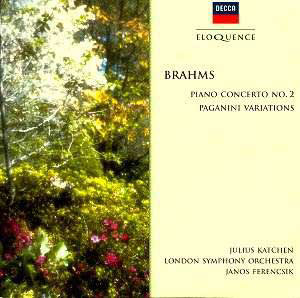Katchen’s death from cancer at forty-three robbed the
world of a musician whose talent had yet fully to develop. It’s salutary
to realise that had he lived he would now be only seventy-five. Though
he recorded widely – Rorem and Britten as well as Mussoursgky - it was
in Brahms that he established something of a hegemony. He was especially
convincing in early Brahms but his traversals of the violin Sonatas
with Josef Suk and the trios with Suk and Starker were profoundly distinguished
and are still amongst the most recommendable of versions. Silent now
since his death in 1969 his Brahms has been reissued variously over
the years – often coupled in more or less helpful compilations. In this
new Decca Eloquence reissue the Second Concerto is joined with the Paganini
Variations – a late concerto and a youthful virtuosic set.
He recorded the concerto with Pierre Monteux as well
as this 1960 performance with Ferencsik in which distinctive qualities
co exist with more troubling features. The 40 year old still sounds
well, rich and deep, but there is a little rawness sometimes which unduly
spotlights orchestral soloists. In the first movement Katchen indulges
in some asymmetrical accents here and there and can sound a little mannered.
The blare of the first trumpet is a distinctive feature of the movement
as is the better-blended woodwind choir and Katchen’s pressured tone.
I felt a slight over nonchalance on his part in some of the filigree
runs and a sense of becalmed stasis at 12’30, which struck me as too
indulged. The fractious angularity of the second movement is well conveyed,
with strong left hand accents but maybe the beautifully melting melody
at 5’10 is too casually played. It sounds to me as if Katchen’s mobile
left hand is subverting, at a quick tempo, his right hand’s lyrical
impulse. I admire his desire not to wallow but would have welcomed a
more flexible rubato the better to fully bring out this passage.
In the Andante Kenneth Heath’s leanly focused
cello solo prefaces the piano’s entry and it’s difficult for the soloist
not to sound lumpy and gauche, one I feel Katchen never wholly overcomes.
Ferencsik meanwhile upholds a really lyrical impulse here, encouraging
affectionate phrasing from the strings, moulding the bass pizzicatos
with finesse. I found the finale, however, problematic. Together with
his soloist neither conductor nor Katchen get quite the right rhythm.
There is instead a rather overdone quality to the music making with
accents and ritardandos rather too predictably imposed. Perhaps I am
alone in finding it all just a bit fey, too lacking in genuine impulse.
There’s much that is attractive here though. Katchen plays with reserves
of tone and technique and Ferencsik is a conductor of involvement but
the air of calculation remains troubling.
The two books of the Paganini Variations are another
matter. There is some colossally brilliant playing here; the Variations
in sixths in Book One is a tour de force, done with virtuosity and panache.
He is, however, uniformly fast and sometimes a little bellicose and
this is not the kind of interior Brahms playing one might want. That
not even Katchen could knock off Book One untroubled can be heard in
the very bad edit at 10’57. Interestingly another lumpy edit at 1’54
in Book Two occurs during the slow waltz like introduction – every bit
as tricky as the more obviously virtuosic passages – but he is here
in general thoroughly and commandingly on form.
Something of a mixed bag, then, with a slightly disappointing
Concerto yoked to the youthfully infectious Variations.
Jonathan Woolf


![]() See
what else is on offer
See
what else is on offer 